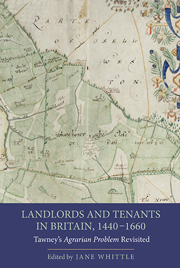Book contents
- Frontmatter
- Contents
- List of Figures
- List of Tables
- Abbreviations
- List of Contributors
- Acknowledgements
- Foreword
- Introduction: Tawney's Agrarian Problem Revisited
- 1 The Agrarian Problem, 1440–1520
- 2 Common Law and Manor Courts: Lords, Copyholders and Doing Justice in Early Tudor England
- 3 Negotiating Enclosure in Sixteenth-Century Yorkshire: The South Cave Dispute, 1530–1536
- 4 The Politics of Enclosure in Elizabethan England: Contesting ‘Neighbourship’ in Chinley (Derbyshire)
- 5 The Loss of Athelstan's Gift: The Politics of Popular Memory in Malmesbury, 1607–1633
- 6 In Search of the Scottish Agrarian Problem
- 7 The Transfer to Leasehold on Durham Cathedral Estate, 1541–1626
- 8 The Financial Rewards of Winning the Battle for Secure Customary Tenure
- 9 Risks and Rewards in Wasteland Enclosure: Lowland Lancashire c.1500–1650
- 10 Improving Landlords or Villains of the Piece? A Case Study of Early Seventeenth-Century Norfolk
- 11 The Agrarian Problem in Revolutionary England
- 12 Agrarian Capitalism and Merchant Capitalism: Tawney, Dobb, Brenner and Beyond
- Conclusions
- Select Bibliography
- Index
1 - The Agrarian Problem, 1440–1520
Published online by Cambridge University Press: 05 September 2013
- Frontmatter
- Contents
- List of Figures
- List of Tables
- Abbreviations
- List of Contributors
- Acknowledgements
- Foreword
- Introduction: Tawney's Agrarian Problem Revisited
- 1 The Agrarian Problem, 1440–1520
- 2 Common Law and Manor Courts: Lords, Copyholders and Doing Justice in Early Tudor England
- 3 Negotiating Enclosure in Sixteenth-Century Yorkshire: The South Cave Dispute, 1530–1536
- 4 The Politics of Enclosure in Elizabethan England: Contesting ‘Neighbourship’ in Chinley (Derbyshire)
- 5 The Loss of Athelstan's Gift: The Politics of Popular Memory in Malmesbury, 1607–1633
- 6 In Search of the Scottish Agrarian Problem
- 7 The Transfer to Leasehold on Durham Cathedral Estate, 1541–1626
- 8 The Financial Rewards of Winning the Battle for Secure Customary Tenure
- 9 Risks and Rewards in Wasteland Enclosure: Lowland Lancashire c.1500–1650
- 10 Improving Landlords or Villains of the Piece? A Case Study of Early Seventeenth-Century Norfolk
- 11 The Agrarian Problem in Revolutionary England
- 12 Agrarian Capitalism and Merchant Capitalism: Tawney, Dobb, Brenner and Beyond
- Conclusions
- Select Bibliography
- Index
Summary
R. H. Tawney's Agrarian Problem was an extraordinary achievement: it dealt with so many dimensions of the subject, identifying the key issues and presenting them with clarity and vigour. It is hard to appreciate that a hundred years have passed since its publication, and there are few books which retain their value after such a long passage of time. We tend to read a work of this period in the expectation that it will seem quaint and naïve. Instead, Tawney's treatment of his subject is not so different from our own. Often in planning and writing this chapter, I supposed that he would have omitted some part of our analysis of the period which I imagined to be relatively new, only to find that the thought had already occurred to him. The ‘modernity’ of his research and presentation is apparent in his awareness of regional differences, for example. He practised empathy, imagining how countrymen of the sixteenth century saw the changes of their own lifetime. He grasped points intuitively, as when he said that there was no great general advance in agricultural productivity between the later Middle Ages and the seventeenth century, which has been confirmed after painstaking archival research. He used a wide range of sources, which included not just the manorial and state records, and pamphlets and sermons, but also estate maps which mark an early venture into ‘landscape history’ before that term was invented.
- Type
- Chapter
- Information
- Landlords and Tenants in Britain, 1440-1660Tawney's 'Agrarian Problem' Revisited, pp. 19 - 34Publisher: Boydell & BrewerPrint publication year: 2013



